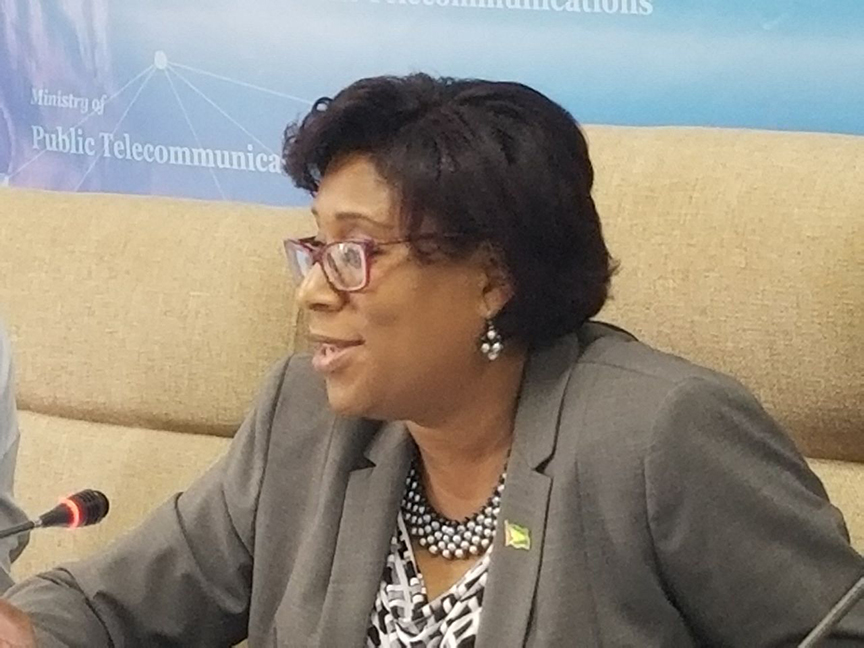The commencement order establishing the Telecommunications Agency was signed last Friday, in anticipation of the liberalisation of the telecoms sector, Minister of Public Tele-communications Cathy Hughes announced yesterday.
Hughes told a press briefing in the ministry’s boardroom that although a board has not yet been appointed for the agency, its establishment at this time is due to the volume of administrative work that is required for its functioning. She added that they did not want to wait until the end of the liberalisation period to start the process of getting the agency up and running.
The new agency will absorb the National Frequency Management Unit, which currently manages the local frequency spectrum. It is expected that it will function as an advisory body, reviewer of licence applications and regulator of the use of the spectrum.
The minister was not keen on announcing a date for liberalisation as she acknowledged that it kept shifting. However, she later related that by June, the ministry will be in the position to address applications they have received from companies and put out requests for proposals.
“…As you could imagine, these things will take some time and we wanted them to be in place before the agency is required to regulate, since we expect significant demand on the agency from day one of its complete operation. We continue to receive a high number of enquiries regarding investment in the telecoms sector. And we expect that on the opening of the sector, the agency will be inundated by applications for licences for the provision of various services,” she said.
She noted that over the past six months, the ministry has received as many as 20 enquiries from companies, including about 10 foreign firms, which have either sent proposals, or enquired about applications for new licences.
“I have to acknowledge that the date for liberalisation has unfortunately been a moving target. I do not wish to give you another target that will move. Just to say that we are making good progress, examining the proposals and the measures for liberalisation from Atlantic Tele-Network International (ATNI), which of course you know is the parent company of GTT,” Hughes stated.
She said they continue to meet with Digicel to finalise the terms of the licence it will be issued and they are also now in possession of the final report on spectrum management issues and are working on the pricing structure.
She further related that on Friday the ministry engaged the Commissioner-General of the Guyana Revenue Authority (GRA) on progress they are making on the negotiation process.
Liberalisation of the ICT sector, which was expected to be completed by July last, continues to be stalled by tax issues involving GT&T and the GRA.
She noted that only the Minister of Finance and GRA’s Commissioner-General can answer questions in relation to that aspect.
Nevertheless, Hughes yesterday repeated her earlier sentiment that the ministry is committed to ensuring liberalisation in the “fastest possible time,” regardless of the fact that the ministry has no authority over the work of the GRA.
Perspective
“If you recognise that GT&T and ATN have had a monopoly situation that’s lasted, you know, over 20 years, then you can understand that from the perspective of both parties they want to make sure that they’re coming to the table to get the best and also to ensure that at the end of the day on the government side we want to make sure that we get the deal that is going to be good for the people of Guyana,” Hughes stated.
“We believe that competition brings several more positive opportunities to citizens, and really, I’d mentioned before that at the end of the day…the Guyana Revenue Authority and the Commissioner-General have wanted to make sure that they’re covering all their bases from the financial end, from taxes that would have been paid, from things that could be offered to the sector as a whole. And therefore, the focus is not on getting this done in the shortest space of time but making sure that we come up with an end game that suits everyone and the
government is extremely careful in ensuring that we’re coming out with a deal that we’re happy with,” she added.
According to the Explanatory Memorandum of the Telecommunications Bill, the bill provides for an “open, liberalised and competitive telecommunications sector that will be attractive to new market entrants and investors while preserving the activities of the current sector participants.” It says that by creating this environment, the bill is expected to result in “greater choice, better quality of service and lower prices for consumers.”
In an effort to further national and regional social economic development, the bill also specifically addresses the expansion of telecommunications networks and services into unserved and underserved areas through the institution of a new universal access/universal services programme.
With regards to the functions of the agency, the bill states that subject to the provisions it shall “advise and make recommendations to the Minister, and implement his directions, on telecommunications- and spectrum-related policies at the national, bilateral, regional and international levels.” The agency is also to advise the Public Utilities Commission (PUC) on matters regarding its functioning as well as receive and review applications for licences, exemptions and frequency authorisations and provide its analyses, advice and recommendations to the minister.
It says too that that the agency’s functions shall be discharged by a nine-member board, which is appointed by the minister, including three persons named by the minister, one of whom shall be designated by the minister as Chair of the Board; two persons named by the Leader of the Opposition after consultation with the Opposition Parties in the National Assembly; the Director of Telecommunications of the Agency; one person named by the private sector after consultation among persons from private sector bodies; one person named by consumer bodies after consultations among persons from such bodies; and one person named by the Vice-Chancellor of the University of Guyana.










